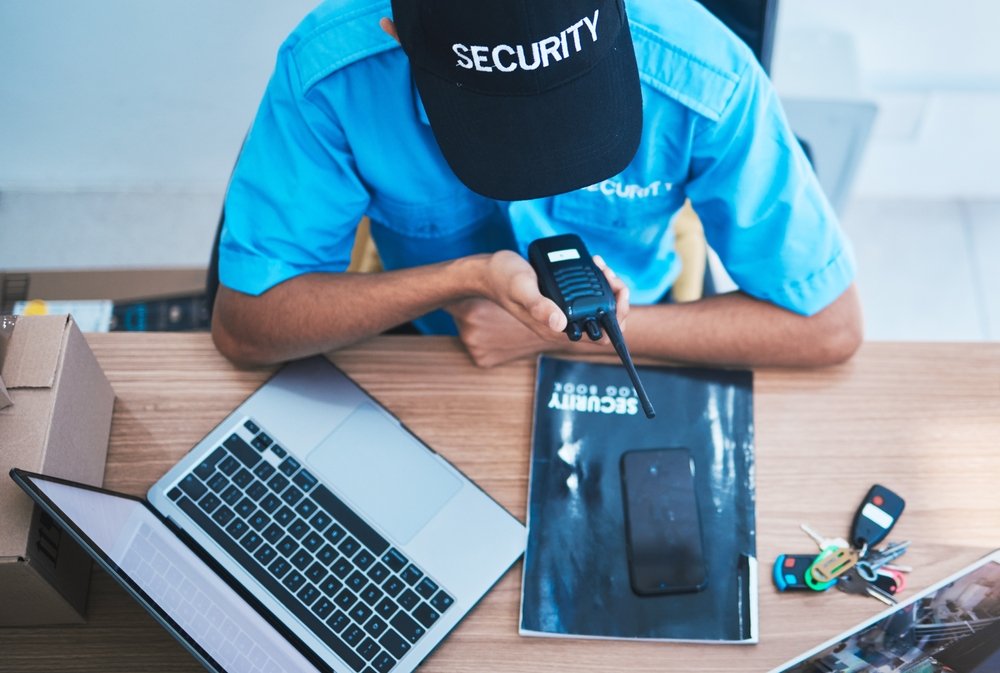
Want to know how to start a security company in 2025? This comprehensive guide breaks down everything from licenses and insurance to staffing and client acquisition, helping you launch your security guard business with confidence.
Starting a security company offers a tremendous opportunity in today’s market. Rising security concerns, urban development, and increasing demand for professional protection services create ideal conditions for new businesses. Whether you want to offer mobile patrol security services, event protection, or specialized guard services, this guide walks you through every critical step.
At Uniworth Security, we’ve built a successful security business by following proven strategies and maintaining operational excellence. This guide shares insights from real-world experience to help you avoid common pitfalls and build a thriving private security business.
TL; DR: How to Start a Security Company
Before diving into details, here’s an overview of the 10 essential steps for starting a security company:
- Define your security niche: Choose services like patrols, events, or alarm monitoring based on local demand
- Write a comprehensive business plan: Set goals, identify target markets, and establish pricing strategies
- Set up your infrastructure: Acquire uniforms, equipment, vehicles, and office space
- Register your business: File LLC or corporation paperwork and obtain your EIN
- Get required licenses and permits: Secure state business licenses and security-specific credentials
- Obtain necessary insurance: Get liability, workers’ comp, and specialized coverage
- Implement management software: Use technology for scheduling, reporting, and operations
- Hire and train employees: Recruit licensed guards and provide comprehensive training
- Market your business: Build online presence, network locally, and attract clients
- Monitor and scale operations: Track metrics, gather feedback, and expand strategically
Now let’s explore each step in detail.
Step 1: Define Your Security Niche
The first critical decision when starting a security company is choosing what services you’ll provide. Most successful new companies focus on one primary service initially, then expand after establishing steady clients and trained teams.
Common Security Service Options
Residential Security: Patrol apartment complexes, gated communities, and HOA neighborhoods. Guards conduct vehicle and foot patrols, respond to resident complaints, monitor gate activity, and provide visible deterrence. This niche offers steady, long-term contracts with property management companies.
Commercial Security: Protect office buildings, retail stores, and industrial facilities. Services include monitoring surveillance systems, managing access control, responding to after-hours alarms, and preventing theft or vandalism. Commercial clients typically require professional reporting and accountability.
Event Security: Provide protection for concerts, sporting events, festivals, and corporate functions. Guards handle crowd control, screen attendees, manage entry points, and respond to emergencies. Event work offers higher hourly rates but requires flexibility and specialized training.
Bodyguard Services: Deliver close protection for high-profile individuals including executives, celebrities, and politicians. This specialized niche requires extensive training and commands premium rates but has limited client bases.
You can also focus on specialized services:
- Alarm Monitoring and Response: Operate a 24/7 dispatch center monitoring alarm systems and dispatching guards when alerts trigger
- CCTV Installation and Monitoring: Install and remotely monitor camera systems for clients
- Access Control Management: Install and maintain keycard systems, PIN pads, and biometric scanners
- Mobile Patrol Security Services: Provide mobile patrol security where guards systematically check multiple properties by vehicle, offering cost-effective wide-area coverage
Research local demand thoroughly before committing to a niche. Drive through your service area identifying potential clients and talk with property managers about their security concerns.
Step 2: Write a Business Plan
Every successful security guard business starts with a solid business plan that guides decisions and keeps operations focused on growth objectives.
Define Your Mission, Vision, and Goals
Start by clearly articulating your company’s purpose:
- Mission: Why does your company exist? Example: “We provide reliable, technology-enabled security services that protect California businesses with transparency and professionalism.”
- Vision: What are your long-term aspirations? Example: “Become the most trusted security provider in Southern California.”
- Goals: Set specific, trackable targets like signing 15 clients within first year or maintaining 95% client retention rate.
Identify Your Target Market
Understanding who you serve determines your marketing messages and pricing strategies. Research these potential markets:
- Retail Businesses: Stores dealing with shoplifting and vandalism need loss prevention and visible deterrence
- Commercial Properties: Office buildings requiring after-hours security and access control
- Residential Communities: Apartment complexes where residents want visible patrols and package theft prevention
- Construction Sites: Builders protecting equipment and materials from theft
- Event Venues: Facilities hosting concerts and sports requiring crowd management
Interview potential clients in each category to learn their biggest security concerns and what they dislike about current providers.
Analyze the Competition
Research existing security companies in your market:
- Identify Competitors: Search Google and Yelp for security companies in your area
- Evaluate Their Offerings: Visit competitor websites noting their services and pricing
- Read Client Reviews: Study recurring complaints like poor communication or missed patrols
- Mystery Shop: Call as a potential client to evaluate their customer service
- Assess Their Presence: Review their social media activity and community involvement
Ask yourself: What do successful competitors do well? Where do they fall short? What can you offer that’s faster, clearer, or more reliable?
Outline Your Staffing and Procedures
Document how your security guard business will operate:
Key Roles:
- Licensed security officers meeting state requirements
- Administrative staff managing scheduling and payroll
- Sales personnel finding contracts
Required Equipment:
- Professional uniforms
- Two-way radios or communication devices
- Flashlights, body cameras, and patrol tools
- Marked vehicles for mobile patrol security services
Standard Procedures:
- Daily guard duties and reporting requirements
- Incident reporting and escalation procedures
- Emergency response protocols
- Client communication standards
Create an operations manual documenting these procedures for consistent service delivery.
Step 3: Set Up Your Infrastructure
Before taking your first contract, establish the foundational infrastructure your security company needs.
Build Your Team
Start with a lean but capable team including licensed security officers, administrative support for scheduling and compliance, and someone handling sales and client services.
Acquire Essential Equipment
Equip your team properly with professional uniforms, two-way radios or PTT phones, flashlights and body cameras, first aid kits, and for mobile patrol security services, reliable vehicles with appropriate branding.
Establish Operations Center
Set up office space where you meet clients, conduct training, and coordinate operations. Designate space for dispatch capabilities and implement scheduling software and communication systems.
Step 4: Register Your Business
Formalize your security company legally by completing registration requirements.
Choose Legal Structure
Most security guard businesses register as either LLC or Corporation:
- LLC: Offers liability protection, pass-through taxation, and simpler management. Ideal for small to midsize companies.
- Corporation: Provides formal structure and easier capital raising. Suitable for larger operations planning significant growth.
Select and Register Business Name
Choose a professional name that’s available in your state. Check availability through your state’s business registration database and ensure the matching domain name is available.
Obtain Employer Identification Number
Apply for an EIN through the IRS website—the process takes minutes and costs nothing. Your EIN enables hiring employees, opening business bank accounts, and filing taxes.
Step 5: Get Licenses and Permits
Operating a security company legally requires proper licensing at both business and individual levels.
Business-Level Licenses
General Business License: Obtained through your city or county, this basic license permits operating any business in your jurisdiction.
Security Business License: Most states require specific licensing for companies providing security services. Application processes include proof of insurance and background checks on owners.
Private Patrol Operator License: States like California require PPO licenses for companies providing patrol services. Requirements typically include minimum age requirements, clean criminal background, proof of experience, passing written examination, and liability insurance proof.
Individual Guard Licenses
Every security officer must hold appropriate licensing:
Security Guard License: Basic license for unarmed security guard services requiring background checks, approved training completion, and passing examinations.
Armed Guard License: Required for armed security guard services, with additional requirements including firearms training and qualification, psychological evaluation, and annual requalification.
As the business owner, you’re responsible for verifying every employee maintains current, valid licensing.
Step 6: Obtain Insurance
Insurance protects your security company, employees, and clients from financial catastrophe.
Essential Insurance Policies
General Liability Insurance: Covers property damage, bodily injury, and legal claims. Most contracts require minimum coverage of $1-2 million per occurrence. Annual premiums typically range from $3,000-$10,000.
Workers’ Compensation Insurance: Required by law in most states, covering medical expenses and lost wages when employees are injured. Budget 3-8% of payroll for this coverage.
Commercial Auto Insurance: Mandatory if operating mobile patrol security services or company vehicles. Expect $1,200-$3,000+ annually per vehicle.
Specialized Security Insurance
Professional Liability Insurance: Covers claims arising from failure to prevent losses or errors in judgment.
Firearm Liability Insurance: Required for armed security guard services. This specialized coverage is expensive ($5,000-$20,000+ annually) but absolutely necessary if offering armed services.
Work with insurance brokers specializing in security industry coverage who understand unique industry risks.
Step 7: Implement Security Management Software
Modern security companies require technology for operational efficiency and competitive advantage.
Essential Technology Needs
Scheduling and Dispatch Software: Professional systems match qualified guards to appropriate posts, prevent scheduling conflicts, handle last-minute changes, and track certifications.
Time Tracking and Payroll: GPS-verified clock-in/out preventing time theft, automatic overtime calculation, and integration with payroll services.
Incident Reporting: Digital systems with mobile apps allowing instant report filing, photo attachments, standardized formats, and automated distribution to clients.
Guard Tracking: GPS and geofencing technology verifying guards arrive at assigned locations, tracking patrol routes for mobile security patrols, and providing real-time visibility.
Client Portal Access: Give clients transparency through viewing scheduled guards, accessing incident reports immediately, and downloading compliance documentation.
Training Your Team
When implementing systems, conduct comprehensive training showing every guard how to use mobile apps and submit reports. Provide reference materials with screenshots and step-by-step instructions. Start simple and introduce features progressively.
Modern security management technology transforms operations from chaotic to professional while meeting client expectations for GPS tracking and digital reports.
Step 8: Hire and Train Employees
Your security guard business succeeds or fails based on employee quality.
Recruiting Security Officers
Define requirements clearly including valid state license, clean criminal background, reliable transportation, professional appearance, strong communication skills, and willingness to work irregular hours.
Post positions on Indeed, ZipRecruiter, security-specific job sites, community colleges offering security programs, and veteran organizations.
Conduct thorough screening by verifying licenses, running comprehensive background checks, checking references, and conducting professional interviews.
Training Programs
Provide comprehensive training including:
Initial Orientation (2-3 days):
- Company mission and service standards
- Client expectations
- Communication protocols
- Technology systems and mobile apps
- Emergency procedures
- Report writing standards
Post-Specific Training:
- Site layouts and access points
- Client-specific procedures
- Equipment operation
- Key contacts
Ongoing Development:
- Quarterly refresher training
- Annual CPR recertification
- De-escalation training
- Customer service skills
- Legal updates
Specialized Training for services like firearms training for armed security guard services, defensive tactics, fire watch procedures, and event security management.
Compliance and Safety
Ensure operations comply with OSHA guidelines and state regulations. Document clear policies regarding use of force, incident reporting, equipment care, vehicle operation, and client interaction.
Quality training creates professional guards who provide better service, generate fewer complaints, and stay employed longer.
Step 9: Market Your Security Business
Effective marketing generates a steady inquiry flow and builds brand recognition.
Build Strong Online Presence
Professional Website: Ensure it clearly explains services, lists service areas, showcases testimonials, displays licenses and insurance, provides easy contact methods, features mobile-friendly design, and includes helpful content.
Search Engine Optimization: Optimize for local search by including location-specific keywords, creating service pages for each offering (mobile patrol security services, armed security guard services, etc.), maintaining Google Business Profile, generating positive reviews, and producing helpful content.
Social Media Presence: Maintain active profiles on LinkedIn for B2B connections, Facebook for local community engagement, and Instagram for visual content.
Local Networking
Join business organizations including Chamber of Commerce, property management groups, and construction associations. Attend industry events and participate in community activities to build visibility.
Direct Marketing Strategies
Targeted Outreach: Identify potential clients, research property owners, send personalized introductions, and offer free security assessments.
Referral Programs: Ask satisfied clients for referrals, offer referral incentives, and make referring easy.
Launch Promotions: Attract initial clients with discounted rates for first 90 days, free assessments, and no initial contract commitments.
Client Retention
Deliver exceptional service consistently, maintain regular communication through service reports and quarterly reviews, request reviews and testimonials, and provide value beyond basic service.
Step 10: Monitor and Scale
After launching, systematically track performance and plan strategic growth.
Key Performance Metrics
Monitor client retention rate, incident response times, client satisfaction scores, employee turnover, revenue per client, operational efficiency, and online reputation.
Gather Feedback
Implement regular feedback collection through post-service surveys, quarterly business reviews, and annual satisfaction surveys. Create channels for employee input about client issues, equipment problems, and training needs.
Strategic Growth
Once operations run smoothly, consider:
- Geographic Expansion: Extend services into adjacent areas
- Service Expansion: Add complementary services like starting with unarmed security guard services then adding armed security guard services
- Market Segment Expansion: Move from retail to commercial properties or residential communities
- Strategic Partnerships: Partner with property management companies or technology providers
- Technology Upgrades: Continuously improve operational systems
Focus on quality over rapid growth. Ensure systems and training scale with your client base.
Should You Start a Security Company in 2025?
Yes—the security industry continues growing driven by rising security concerns, urban development, client demand for transparency and technology, and opportunities in specialized niches.
Success requires professional approach including understanding licensing and operational requirements, delivering consistently excellent service, implementing modern technology, hiring quality personnel, marketing effectively, and operating with integrity.
Things to Consider Before Starting
Research Local Market
Assess demand by driving your service area and talking with potential clients. Understand your competition through website reviews and mystery shopping. Evaluate whether markets are oversaturated.
Calculate Startup Costs
Honest cost assessment prevents underestimating capital needs:
- Licensing and Legal: $2,000-$5,000
- Insurance: $8,000-$20,000 first year
- Equipment and Uniforms: $3,000-$10,000
- Vehicles: $5,000-$30,000
- Technology: $2,000-$5,000
- Marketing: $3,000-$10,000
- Operating Capital: $15,000-$40,000
Total estimated investment: $40,000-$100,000 for basic operations.
Develop Competitive Advantage
Identify specific advantages like technology integration, specialized expertise, superior training, faster response times, transparency, or flexible contracting that attract clients willing to pay for superior service.
Benefits of Starting a Security Guard Company
Stable Recurring Revenue: Security contracts provide predictable monthly income once you establish client base.
Scalable Business Model: After establishing systems, adding clients doesn’t proportionally increase management burden.
Meaningful Work: Protecting people and property provides genuine community value.
Diverse Opportunities: Serve various clients providing different services from mobile patrol security services to armed security guard services.
Growth Potential: Successful companies grow substantially from local clients to regional operations.
Frequently Asked Questions
What do you need to start a security company?
You need proper licensing, comprehensive insurance, registered business entity, licensed security officers, professional equipment, and operational systems. Budget $40,000-$100,000 for startup costs.
How much does it cost to start a security company?
Starting a security company typically costs $40,000-$100,000 covering licensing, insurance, equipment, vehicles, technology, marketing, and operating capital. Larger operations may require $150,000+.
What licenses are required to run a security company?
You need a general business license, security business license, and often Private Patrol Operator license. Individual guards need state-issued security guard licenses. Requirements vary by state.
Do I need insurance to operate a security company?
Yes, insurance is essential. Minimum coverage includes general liability ($1-2 million) and workers’ compensation. Additional coverage includes commercial auto, professional liability, and firearms liability for armed security guard services.
How long does it take to start a security company?
You can start a security company in 30-90 days with efficient preparation. Timeline includes business registration (1-2 weeks), license applications (2-6 weeks), insurance setup (1-2 weeks), and hiring staff (2-4 weeks).
Can I start a security company without prior experience?
Yes, if you conduct thorough research, hire experienced personnel, and implement proper systems. Many successful owners come from business backgrounds rather than security work.
What’s the difference between a PPO license and security guard license?
A PPO license authorizes operating a security guard business, while security guard licenses permit individuals to work as officers. You typically need both depending on your state.
How do I get clients for my security company?
Build a professional website, maintain Google Business Profile, network through business organizations, conduct direct outreach, offer free assessments, provide launch promotions, and deliver exceptional service generating referrals.
Should I offer armed or unarmed guard services?
Decision depends on market demand and regulatory requirements. Armed services command higher rates but involve higher insurance costs, stricter licensing, and greater liability. Many companies start with unarmed security guard services then add armed security guard services after building experience.
What software do security companies use?
Modern security companies use specialized workforce management software handling scheduling, GPS tracking, digital reporting, checkpoint verification, license tracking, and client portals.


